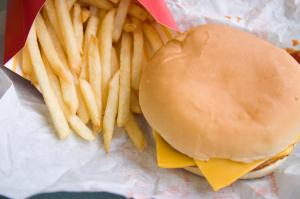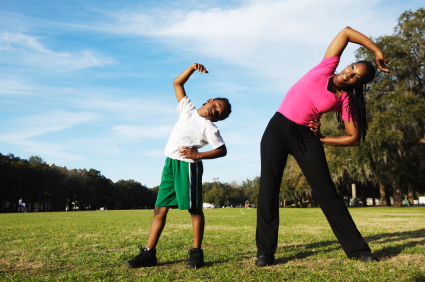We're all pretty tired of hearing about childhood obesity. But in case you need a reminder, here are just some of the startling statistics:
- The number of children classified as obese has doubled over the past two decades
- One in five children will become obese adults
- The number of U.S. children having obesity surgery has tripled in recent years
- With childhood obesity at epidemic levels, adult ailments are now more commonly found in children, including heart disease, diabetes, hypertension, and high blood pressure.
We've heard the bad news so often, it seems that we've become numb to the seriousness of a situation which, experts predict, will make this generation the first to have a shorter lifespan than their parents.
So let's stop talking about it and do something about it. But where to start?
Pointing fingers
 If you want to play the blame game, you could point your finger at a lot of possible culprits:
If you want to play the blame game, you could point your finger at a lot of possible culprits:
- Fast food restaurants: American kids eat a fast-food meal one out of every 3 days;
- School lunches: One in every five public schools in the US sells branded fast food in the cafeteria; just one cheeseburger is 590 calories, and pizza is considered a vegetable (!);
- The government: To balance the budget and increase instructional time, school boards across the country are doing away with recess and dropping physical education (PE);
- The electronic age: Video games, TVs, computers and iPods keep kids indoors and turn them into couch potatoes.
All of this is true, but blaming restaurants, schools, the government, and electronic gadgets will not help our kids. Instead, it's time for us as parents to put love into action and take full responsibility for our children's health.
Diet and lifestyle do's and don'ts
Here are some do's and don'ts that will help you make the diet and lifestyle changes that will turn the statistics around and give your children the foundation for long, healthy lives:
1. Model a healthy lifestyle
If you're serious about helping your child attain and maintain a trim and fit body, you must be the first one in your family to make the changes that will put all of you on track in this race for fitness. Whether you have a weight problem yourself or not, the way you live your life sets the bar for the lifestyle habits of your children. You can't be a junk-food eater and an inactive couch potato and expect your child to be anything different. That means it's time to:
- Drastically reduce your intake of processed food, fast food, high-calorie vending-machine-type snacks, and soda
- Fill your daily diet with whole grains, fruits, vegetables and water
- Get physically active in some small way every day: take the stairs instead of the elevator, park the car far from the store
- To ease your stress at the end of the day, skip the donut or glass of wine and instead take a brisk walk or hit the exercise bike
2. Monitor your child's leisure activities
Even if you're a working parent, it's important to arrange for active, productive after-school and weekend time for your child that does not include snacking and a passive electronic entertainment:
- Set a one hour limit on time spent sitting in front of the TV/computer/video game console each day (a recent study in JAMA Pediatrics (Gentile, et al, 2014) shows that increased parental monitoring can affect a wide range of academic, physical and social health outcomes)
- Schedule active time that includes either sports participation or family outdoor activities such as walking, biking, or hiking
- When your child is old enough to handle the responsibility, let them walk, bike or skate to destinations within a reasonable distance. Do not drive them to the movie theater that's two blocks away!
3. Control your child's diet
As kids get older and spend more time away from home with money in their pockets, it's tough to micro-manage every morsel of food they eat, but, at the very least, make sure that the food in your home is low-cal and nutritious:
- Clean out the junk: Remove high-calorie junk food snacks (potato chips, ice cream, cup cakes, sugar cereals, soda or sugar juices in the house) from the kitchen pantry. Kids need to have some sweets, but all in moderation
- Stock healthy snack alternatives such as fresh fruits, celery and carrots, nuts, low-fat cheese, whole-grain English muffins with low-fat peanut butter, and low-fat yogurt;
- Eliminate fast food from your diet;
- Avoid fad diets. Do not put your child on a restrictive diet. It is more important to be aware of what types of foods your kids are eating and their portion sizes than to attempt to maintain specialized "fad" diets. Most diets are unrealistic and promote deprivation rather than promoting a healthy lifestyle change and smart decision-making;
- Practice portion control. In 1987 we were drinking 6 ½ ounce bottles of soda at 85 calories; today the typical bottle is 20 ounces and 250 calories. A fast-food cheeseburger in 1987 contained 333 calories; today it's 590 calories. This is part of the reason why we are a super-sized nation. Put less food on the plate - it's as simple as that;

- Create a daily meal plan that focuses on these three key elements:
- variety - serve different foods from all the food groups;
- balance --- offer enough servings from each of the groups to meet nutritional needs; and
- moderation--- not too much of any one food or food group.
4. Just say "No"
Give yourself permission to say "no" with confidence. You're the parent; you have the right and the responsibility to take charge of your child's health and well-being:
- "No, you cannot have a second helping"
- "No, you cannot eat ice cream for lunch"
- "No, you cannot have soda with your meal"
- "No, you cannot have a car ride to the corner"
- "No, you cannot watch any more TV today"
Is it easy to keep our children trim and fit while living in a junk-food, high-calorie world? No, not at all. But that's why our kids can't do it alone. They need our guidance, support, and example to help them establish lifestyle habits that will lead to a healthy, long life.
Tony Sparber is the founder/owner of New Image Camps: Camp Pocono Trails, PA and Camp Vanguard, FL. New Image Camps are designed to provide the most comprehensive summer weight-loss program for children and teens in the country. For additional information call 1-800-365-0556 or visit www.newimagecamp.com.
Sources:
Gentile DA, Reimer RA, Nathanson AL, Walsh DA, Eisenmann JC. Positive Effects of Parental Monitoring of Children's Media Use: A Prospective Study. JAMA Pediatrics 2014;doi:10.1001/jamapediatrics.2014.146 (published online March 31, 2014).








